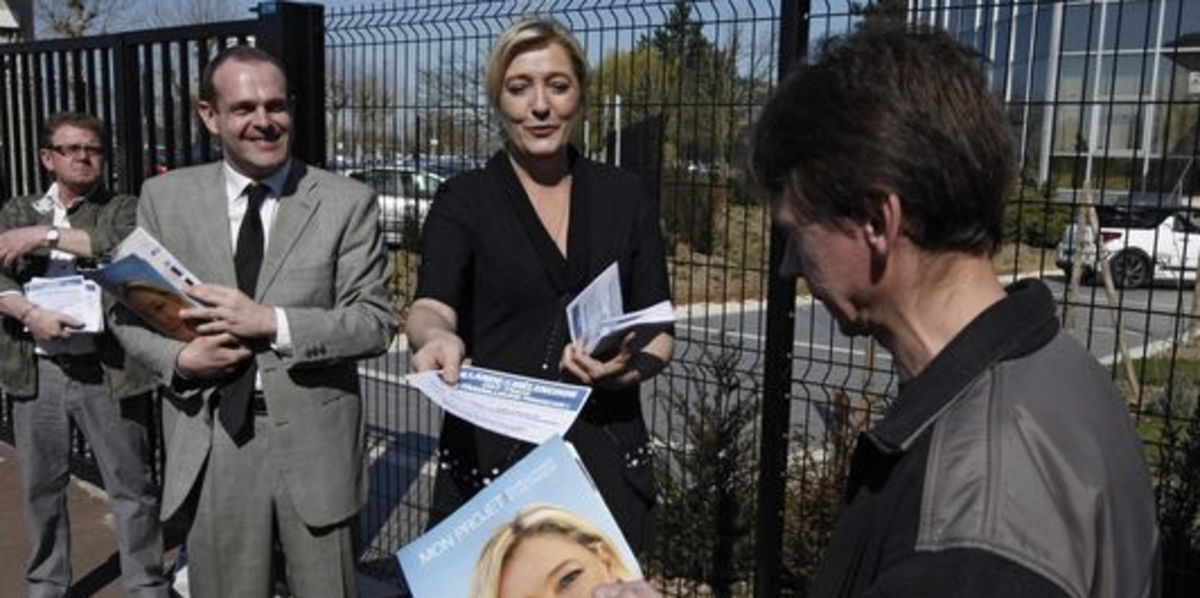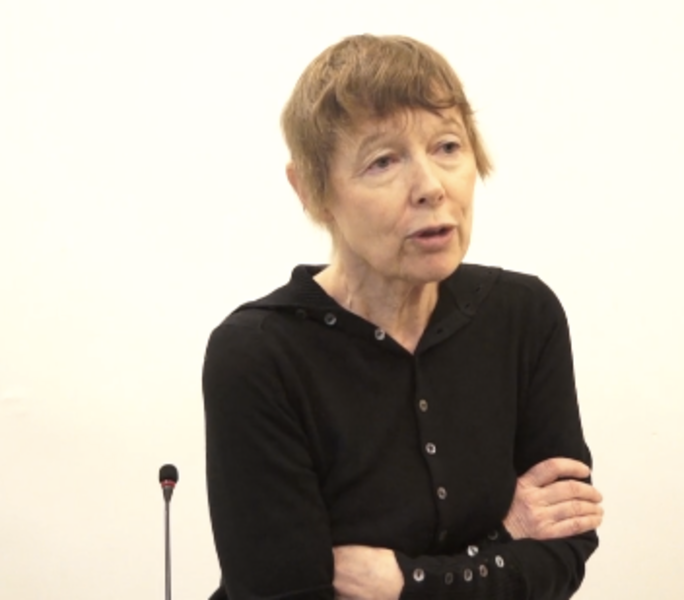France heads to the polls on March 23rd and 30th for nationwide municipal elections in which the far-right Front National (FN) is widely forecast to see a strong rise in support. Amid a deep economic crisis, with unemployment at 10.2%, the mainstream political parties are in difficulty: while the socialist government’s popularity continues to plummet, the conservative opposition is reeling from internal divisions and a series of recent scandals.
FN leader Marine Le Pen drew just less than 18% of the vote in presidential elections in 2012, and her party has often been described by media commentators (and even former socialist government minister Jean-Pierre Chevènement), as having become the leading party among blue-collar workers.
The relatively recent rise in blue-collar support of what was once a marginal political movement is widely interpreted as a swing of votes away from the Left, notably on the part of lowest income earners. But that conclusion was dismissed as a myth during a conference held in Paris on February 25th, organised by the left-wing think tank, the fondation Jean Jaurès, and which brought together sociologists and political scientists specialized in studies of the French far-right to define what makes up its support base and to chart its progression.

Among the speakers were Nonna Mayer and Florent Gougou, researchers with the Paris Institute of Political Sciences’ Centre of European Studies. Mayer, who is also a research director with France’s National Centre for Scientific Research (CNRS), is a specialist on the Front National party, while Gougou has focussed his research on the blue-collar vote in France.
“All the opinion poll institutes agree in saying that [blue-collar] workers vote on average more for the Front National than the average among the electorate, but the [estimations of the] size of this vote differs greatly,” Gougou told the conference.

The first polling institute to measure the number of blue-collar workers who voted FN was SOFRES in 1995. It carried out two separate polls, both using exactly the same methodology, but which showed a 7% difference between them: 30% of blue-collar workers supported the FN in the first, while that fell to 23% in the second.
Gougou also underlined that while blue-collar workers now make up what he estimates at between 30% - 35% of the FN’s electorate, they accounted for 50% of the Communist Party vote according to data collected when the party was still a national political force, in 1967 and 1978.
But beyond the hazardous estimations of the exact size of blue-collar support for the FN lies the question of why it exists. Gougou, who completed a thesis on the evolution of blue-collar voting habits, has studied a series of small municipalities with large working-class populations, measuring election results and opinion poll findings.
He found that right-wing blue collar workers vote more for the FN than for the traditional, moderate parties of the Right, and this support is higher than among other social groups, in a trend that began with the first significant electoral victories for the party, in European elections in 1984 and legislative elections in 1986.
He told the conference how he also found that the progression of blue-collar support for the FN was in parallel to a fall in working-class support of the Left which began at the end of the 1970s. “Since the 2000s, they vote for the Left as much as the rest of the electorate, whereas in the 1970s they massively voted for the Left, up to 20% more,” explained Gougou.
In his typology study, the trend is quite clear: left-wing heartlands are switching to the Right, but Gougou underlined that the interpretation of this data must be made with caution.
“It is not the same workers who yesterday voted for the Left who now vote for the Front National,” he said. His studies show that this change is down to a new generation of blue-collar workers who have now become part of the electorate. “Their parents were left-wing, but they [themselves] have never had a habit of voting for the Left,” Gougou added. “They have the same profession [as their parents], but they have been socialized in a different world, in which the FN is present.”
On the one hand, argued Gougou, is a generation whose political leanings developed during the 1960s and earlier when the Communist Party occupied the main space on the Left, and on the other is a generation which developed its political choices during the 1990s, when the FN became a political force. He concludes that the fall in support for the Left is down to the arrival of this new electoral corps.
Gougou sees a watershed moment in the 2007 presidential elections won by Nicolas Sarkozy. “The working-class electorate of the Right radicalized during the 1980s was more attracted by Nicolas Sarkozy in 2007 than the younger, new working-class electorate,” he says. He says this was again the case in the 2012 presidential elections.
'It is those afraid of losing something who vote FN'

Gougou's colleague Nonna Mayer also believes blue-collar support for the FN is essentially from among those already anchored on the Right. “There is clearly a right-wing working class who are more attracted by Marine Le Pen,” she said.
Mayer made a detailed study of blue-collar voters for Marine Le Pen in the 2012 presidential elections when the FN candidate scored 17.9% of the vote in the first round (she and seven other candidates were beaten by Sarkozy and Hollande who went through to the second round).
“All the indicators show the same thing,” she told the conference. “For example if you ask them to which party they feel closest, it is the parties of the Right and the far-right. Or how they voted in [the presidential elections of] 2007. Of those who voted Marine Le Pen in 2012, 5% voted for [Socialist Party candidate] Ségolène Royal in the first round [of the 2007 presidential elections] and 7% in the second round.”
Mayer dismissed the commonly received view that the FN attracts a blue collar vote out of despair with the rest of the political parties, notably among the lowest income earners who in the most precarious social and economic situation. “Who voted the most for Marine Le Pen in 2012? Not those workers in insecure situations who, when they did vote, voted for Hollande,” she said. “It is the non-insecure workers whose vote for Marine Le Pen reached 36.8%. It is those who are afraid of falling [off the ladder]. They look up above, but also down below now, they’re afraid of being downgraded.”
Mayer described this latter category as being generally “a bit more Catholic” than other blue-collar categories, who possess a high amount of household equipment, generally living outside large towns and who have obtained a minor diploma of some sort. “They have a little something that they’re afraid of losing,” she said.
“For years, two variables explained the vote for Le Pen - the level of education, and gender,” added Mayer, whose research indicates that women are no longer a significant minority among the FN’s blue-collar electorate. “Women were more reticent towards this party. In 2012, that is no longer the case. For the first time, when you take age, profession and religion into account, there is no longer a ‘female’ factor. Whereas before, two categories of women didn’t vote Le Pen: elderly Catholics and the young who are qualified, active and feminist. When one looks at the working class in 2012, men and women voted in the same way.”
Last year Mayer carried out a study in which she questioned some 100 people living in insecure economic and social conditions about their views of the FN. She found there was a greater number who felt close to the FN’s arguments than those who actually voted for the party. “You see it when you ask about ‘national preference’, when you ask ‘Is the FN a danger for democracy?’, ‘Does Marine Le Pen represent the far-right?’, ‘are there too many immigrants in France?’”, she said. “There is a sympathy and an attraction for Marine Le Pen and her ideas. During the interviews, you hear ‘I’m not going to vote for Marine Le Pen, I’m not a racist, but she’s maybe right somewhere’.”
But while this support for the FN is significant, it does not translate into votes for the party, Mayer said. “A large part of this disadvantaged working-class population doesn’t vote,” she underlined. “So things could be worse.”
-------------------------
English version by Graham Tearse


